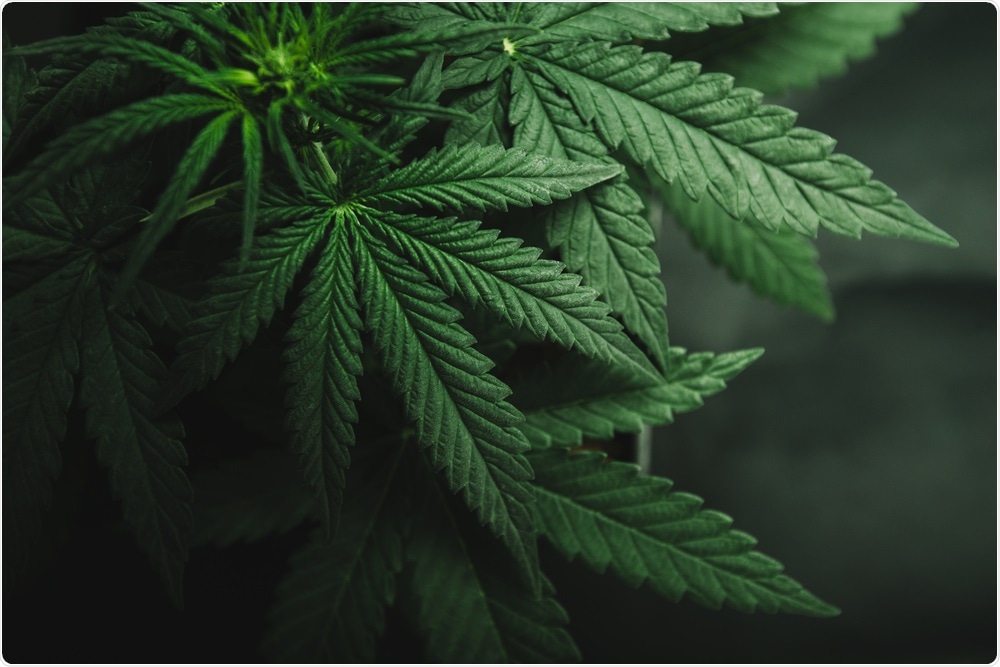A group of scientists from Schulich Medicine & Dentistry combined their mastery to obtain a thorough understanding of the risks linked with cannabis exposure at the time of pregnancy—and initial observations are raising some warning signs.

Cannabis. Image Credit: Yarygin/Shutterstock.com
The team used animal models and showed that exposure to tetrahydrocannabinol (THC), a major psychoactive ingredient in cannabis, at the time of pregnancy adversely impacts placental development and fetal birth weight while also hindering cardiac function and glucose tolerance in the offspring.
Initial observations also suggest that cannabis has a remarkable effect on the developing brain and can result in permanent impacts on cognition and mental health.
Research works have predicted that around a quarter of women use marijuana when pregnant; however, science has started to demonstrate that this might be hazardous to the long-term health of the infant.
There is this idea that because it’s a natural product, it doesn’t have any negative side-effects. But so little is known about those side effects during pregnancy, and that’s why we’ve teamed up to try to shed some light on this question.”
Steven Laviolette, PhD, Professor, Department of Anatomy and Cell Biology, Schulich School of Medicine & Dentistry
Laviolette’s laboratory concentrated on the impacts of cannabis on the adolescent brain for more than 10 years; and just two floors below, Dan Hardy, PhD, has been focusing to understand fetal physiology and causes that influence fetal outcomes. Once Canada legalized cannabis in 2018, the two researchers combined their mastery to analyze how cannabis exposure in utero affects physiology, metabolism, and the brain of the infant.
Steve can look at the brain and behavior and we can look at physiology and metabolism, and together ask some really interesting questions. With the combination of neuroscience and fetal physiology we can explore these things on their own but also see how they influence each other.”
Dan Hardy, Associate Professor in Physiology and Pharmacology, Schulich School of Medicine & Dentistry
Placenta, cardiac function, and metabolism
The first paper from Hardy’s laboratory revealed that regular exposure to THC at the time of pregnancy has a substantial influence on fetal and placental development in rats and has a determinable effect on both the development of the organs of the fetus and the gene expression that is vital to placental function.
The scientists showed that regular exposure to a lower dose of THC, mirroring daily use of cannabis at the time of pregnancy, resulted in a decrease in birth weight of 8% and lowered liver and brain growth by 20%.
Hardy, Laviolette, and Kendrick Lee, graduate student and PhD candidate in Hardy’s lab, employed an echocardiogram to observe the function of the heart. Their latest research identified that this chronic exposure at the time of pregnancy resulted in early-life cardiac dysfunction in the animals.
The major finding is that we were seeing this cardiac dysfunction at such an early stage in the rat’s life. It’s alarming because it is similar to what we might see in an aging heart.”
Kendrick Lee, PhD Candidate, Schulich School of Medicine & Dentistry, Western University
Brain effects
Mina Nashed, a post-doctoral fellow, is working with Hardy and Laviolette to investigate the impacts of prenatal cannabis use on the brain. Early in the year, he published a review paper that apprehended the latest data from research works on the neurodevelopmental impacts of exposure in the uterus, published earlier.
The review revealed impacts on attention, memory, and learning, as well as a heightened risk of developing psychosis, depression, and sleep disturbances.
“The mechanisms that cause these potential deficits remain an area of active research,” stated Nashed, whose work is supported by BrainsCAN. He further added, “We are focused specifically on how the brain is changed by prenatal exposure to THC and CBD at the molecular, structural, and functional levels, and how these changes are related to potential deficits in neuropsychiatric behavior in both male and female offspring.”
A fascinating initial finding was that male offspring seemed to be excessively affected by these neurological changes, stated Laviolette.
“We are still trying to tease apart why the males seem to be more vulnerable, but we are seeing profound changes in the brain in both female and male offspring, and abnormal patterns of activation across different brain areas, and disturbances in the fatty acids that are the most essential building blocks of the human brain,” added Laviolette.
THC versus CBD
As a further step, the researchers intend to analyze if cannabidiol (CBD) alone has similar effects on these systems as THC. CBD is mostly considered as a safer alternative to THC; however, the researchers assert that there are not sure about high-potency CBD, particularly its possible effects on pregnancy.
Subsequent research works have been proposed to analyze the role of cannabis exposure on the paternal side and its role in pregnancy as well as long-lasting metabolic and neurological outcomes.
Source:
Journal reference:
Lee, K., et al. (2021) Exposure to Δ9-tetrahydrocannabinol during rat pregnancy leads to impaired cardiac dysfunction in postnatal life. Pediatric Research. doi.org/10.1038/s41390-021-01511-9.